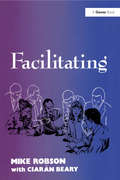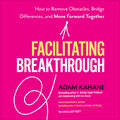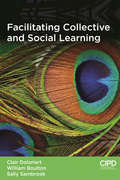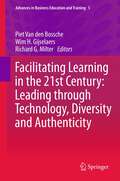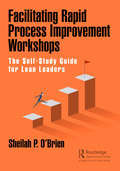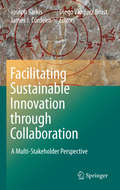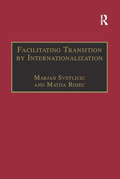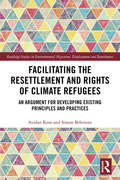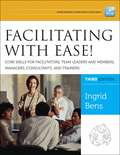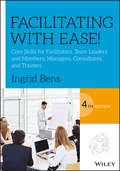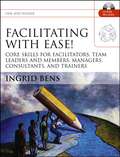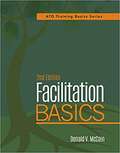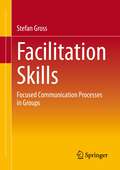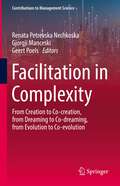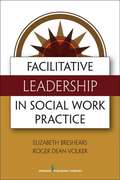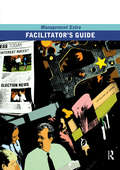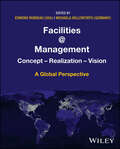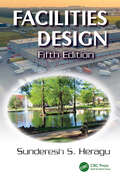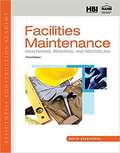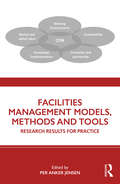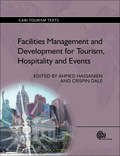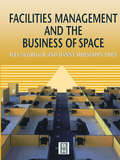- Table View
- List View
Fachkräftemangel im Pflegesektor
by Matthias Klöppner Max Kuchenbuch Lutz SchumacherDas Buch diskutiert das Problem des Fachkräftemangels von Pflegeunternehmen. Unternehmen im Pflegebereich lernen durch die Leuphana Case Study Fachkräftemangel im Pflegesektor wie sie Nachwuchskräfte gewinnen und ihr bestehendes Personal entwickeln und weiter qualifizieren können. Die Case Study behandelt die Frage, was kleine und große Betriebe und Unternehmen in der Altenpflege tun können, um dem drohenden Fachkräftemangel vorzubeugen. Dabei wird ebenfalls erarbeitet, was einen attraktiven Arbeitgeber in dieser Branche auszeichnet. Außerdem werden Maßnahmenkataloge zur Gewinnung und Bindung von Fachkräften aufgestellt. Darüber hinaus setzt sich die Case Study mit weiteren Fragestellungen rund um das Thema Altenpflege auseinander. So werden sowohl die Makroebene als auch die Mikroebene analysiert. Dadurch lernen die Bearbeiterinnen und Bearbeiter der Case Study die gesamtgesellschaftlichen Herausforderungen der Pflegebranche und die Probleme von einzelnen Pflegeeinrichtungen im Speziellen kennen. Daneben wird ein Blick in die Zukunft geworfen, um zukünftige Herausforderungen von Pflegeunternehmen in einem möglichst frühen Stadium zu identifizieren und diese durch detaillierte Planung bereits vor ihrer tatsächlichen Entstehung zu bewältigen.Die Leuphana Case Studies sind ein Projekt, das in Zusammenarbeit mit kleinen und mittelständischen Unternehmen erstellt und entwickelt worden ist. Sie sind ein Lehrbuch, mit dessen Hilfe Unternehmen, die vor ähnlichen Herausforderungen stehen, selbige bewältigen können. Dafür ist keine Hilfe von Dritten notwendig. Auf Grundlage der einzelnen Case Studies werden den Bearbeiterinnen und Bearbeitern elementare Werkzeuge aus der wissenschaftlichen Theorie erklärt. Diese können sie anwenden, um mit den Insiderkenntnissen des eigenen Unternehmens Prozesse zu optimieren, Ziele entwickeln und erreichen oder schwierige Herausforderungen zu bewältigen.
Fachkräftemangel und Maßnahmen-Champions (Demografie und Wirtschaft)
by Hendrik BudligerDer demografische Wandel stellt die Unternehmen vor große Herausforderungen. Neben strukturellen, zyklischen und unternehmensinternen Zusammenhängen ist er eine der Kernursachen für den zunehmenden Mangel an Arbeitskräften, insbesondere an gut ausgebildeten Fachkräften. Dieses Herausgeberwerk gibt einen Einblick in den aktuellen Fachkräftemangel und zeitgleich stellen Maßnahmen-Champions vor, wie sie in ihren Organisationen erfolgreiche Konzepte gegen den Fachkräftemangel umgesetzt haben. Die Leserinnen und Leser sollen von der Vielfalt der beschriebenen Maßnahmen gegen den Fachkräftemangel Ideen und Anregungen erhalten, um selbst in ihrer Organisation dem Fachkräftemangel entgegenzuwirken. Der Inhalt Grundzüge und Konzepte einer Organisationsdemografie Generationenmanagement – Theorie und Praxis Förderung der Arbeitsmarktfähigkeit und Arbeitsfähigkeit Gelebte HR-Strategie im Change-Prozess Digitales Workforce-Management HR Analytics als strategisches Instrument Maßnahmen gegen den Fachkräftemangel: Senior Talents fördern, Vereinbarkeit Familie und Beruf, Integration von Arbeitskräften aus Drittstaaten Praxisbeiträge aus Baugewerbe, Hotelbranche und Tech-Industrie
Fachwörterbuch International Accounting: Deutsch-Englisch/Englisch-Deutsch
by Gerd W. GoedeUm international im Accounting fachspezifisch und frei von Missverständnissen zu kommunizieren, benötigt man das entsprechende bilinguale Fachvokabular. Wie etwa bezeichnet man auf Englisch die Abschlusszahlung? Und was sind receivables?Das Fachwörterbuch International Accounting umfasst alle relevanten Begriffe aus Theorie und Praxis der internationalen Rechnungslegung sowie aus den Bereichen Controlling, Finance und Management und liefert für jede Situation die richtige Übersetzung.Der deutsche Teil enthält mehr als 31.000 Fachbegriffe mit über 47.000 englischen Übersetzungsvarianten, der englische Teil beinhaltet knapp 28.000 Einträge mit circa 40.000 Übersetzungen. Auf britische und US-amerikanische Besonderheiten wird hingewiesen. Gebräuchliche englische Abkürzungen werden erwähnt und am Ende des Buches nochmals gesondert aufgelistet.
Facilitating
by Mike Robson Ciarán BearyHow to manage change, and how to ensure continuous improvement: these are perhaps the two most important challenges confronting businesses today. And increasingly facilitating is being seen as the best way to deal with both. Facilitators - and managers operating in a facilitative style - work on helping individuals, groups and organizations to enhance their performance. This book shows how that can be done. The first part deals with the nature of facilitation and why those involved need to understand the basis of human behaviour. The second covers the management of change at different levels. The third provides practical guidelines on the relevant skills. The fourth looks at the kinds of situation where facilitators can be effective and includes case studies from a wide variety of settings. The final part deals with facilitative styles of management. For any manager or trainer determined to release the unfulfilled potential of their organization and the people in it, this book is the ideal starting point.
Facilitating Breakthrough: How to Remove Obstacles, Bridge Differences, and Move Forward Together
by Adam KahaneA new approach to helping teams solve complex and stubborn problems from the acclaimed author of Collaborating with the Enemy. It&’s becoming less straightforward for people to move forward together. They face increasing complexity and decreasing control. They need to work with more people from across more divides. In such situations, the most common ways of advancing—some people telling others what to do, or everyone just doing what they think they need to—aren&’t adequate. One better way is through facilitating. But the most common approaches to facilitating—bossy vertical directing from above or collegial horizontal accompanying from alongside—also aren&’t adequate. They often leave the participants frustrated and yearning for breakthrough. This book describes a new approach: transformative facilitation. Instead of choosing the bossy vertical or collegial horizontal approach: It cycles back and forth between them. Rather than forcing or cajoling, the facilitator removes the obstacles that stand in the way of people contributing and connecting equitably, enabling them to bring their whole selves to the process. This book is for anyone who helps people work together to transform their situation, be it a professional facilitator, manager, consultant, coach, chairperson, organizer, mediator, stakeholder, or friend. It offers a broad and bold vision of the contribution that facilitation can make to helping people collaborate to make progress. Praise for Adam Kahane&’s books &“Thought-provoking discourse on handling difficult situations.&” —Publishers Weekly &“Profound . . . a wise way to negotiate our toughest group, community, and societal challenges.&” —William Ury, New York Times–bestselling coauthor of Getting to Yes
Facilitating Collective and Social Learning
by Clair Doloriert William Boulton Sally Anne SambrookFacilitating Collective and Social Learning is the essential text for any students studying Learning & Development (L&D) as part of undergraduate or postgraduate courses, and is the supporting text for the CIPD level 5 Unit 5CSL. It will develop your understanding of collective and social learning within the workplace by identifying and exploring what we mean by the terms ‘collective’ and ‘social’, explaining the use of collective over group, collaborative and co-operative learning, and consider the implications of this for L&D and HRD practitioners and their practice. The authors describe the emergent manifestations of collective and social learning within the workplace, and introduce and assess different theoretical models. You will explore the key current social media and e-learning tools, technologies and their applications for L&D, and how social media and e-learning tools can be employed to meet organisational learning objectives.Ideal for professionals looking to further their understanding of the field, you will learn how collective and social learning can support your organisation in achieving its L&D goals and wider business objectives. Easy to navigate and clearly written, Facilitating Collective and Social Learning will provide you with the solid grounding in the theory so that you can apply and benefit from it in practice.
Facilitating Learning in the 21st Century: Leading through Technology, Diversity and Authenticity
by Wim H. Gijselaers Piet Van den Bossche Richard G. MilterThis book tackles the latest challenges in education in the business sector, outlining how the students of the future must be taught to adapt to a highly fluid business environment in which their ability to acquire new skills and collaborate with others is more important than possessing facts. Taking its cue from the growing body of theory advocating multi-faceted and often multilingual education, the book focuses on 'competences' and collaborative, team-oriented, project-based learning. Beginning with a set of studies on the differences in individual learning and ways of supporting students, the volume moves on to a collection of papers on learning at the level of the group, which include material on team learning, and the sharing of knowledge in problem-based learning. The editors view these factors in education as an inevitable feature of pedagogy, reflecting the fact that knowledge, and its acquisition, is increasingly collaborative in our working lives, and especially in business. A final section applies the principles developed in the first two parts at an organizational level, evaluating the enormous implications these developments in our ideas about learning have for the educational institutions charged with teaching future generations. Combining research and theory with practical factors in business education and training, the volume provides wide-ranging perspectives on developing best practice in the sector.
Facilitating Rapid Process Improvement Workshops: The Self-Study Guide for Lean Leaders
by Sheilah P. O'BrienThis is a self-study guide for facilitators of rapid process improvement workshops that helps anyone who feels like they aren’t truly gaining the full results of improvement initiatives and kaizen events. They know they can do better, but don’t know how. The author, an experienced facilitator in government and nonprofits, speaks to the facilitator through coaching notes and actual workshop documents and techniques so the reader can fully understand how greater results are achieved. This guide takes the reader through a step-by-step path of a newly created workshop agenda. The author has parsed the workshop path into more manageable parts, easier for both the facilitator and the team. These parts split the improvement work into two sections: "removing the unnecessary" and "smoothing out the flow." "Smoothing out the flow" is divided further into: When the work is coming in When the product/person is going through the process How the work is performed In addition, the author includes newly created tools and training content. For example, a data-gathering table points the facilitator to what data need to be collected when. Training for the team includes making sure they understand the structure of a process as well as to instruct them and define how a Lean process actually functions. This distinction is important because all improvements are not necessarily Lean improvements. Several bodies of knowledge are incorporated into this guide––not only Lean and Six Sigma, but internal auditing, organizational development, and statistics. Essentially, this guide includes tips, nuances, and original tools that are missing from the traditional training of facilitators of kaizen events. It provides enough information for the facilitator to think in a creative way.
Facilitating Sustainable Innovation through Collaboration: A Multi-Stakeholder Perspective
by Diego Vazquez Brust James J. Cordeiro Joseph SarkisFacilitating Sustainable Innovation through Collaboration, takes an unusually international perspective of sustainable innovation with contributions from Australia, Europe, and North America. Prominent policy makers, scientific researchers and practitioners in this field provide various inputs and analyses relating to the development of sustainable innovations. It is expected that policy makers, organizations, individual researchers, students and even communities can further develop and implement concepts and practices by drawing on the variety of projects and theoretical foundations presented in this volume.
Facilitating Transition by Internationalization: Outward Direct Investment from Central European Economies in Transition (Transition and Development)
by Matija RojecFDI has proved to be the most dynamic defensive and offensive response to globalization. This book provides an in-depth evaluation of the rationale as well as theoretical and empirical explanations of the outward internationalization of firms from the Czech Republic, Estonia, Hungary, Poland and Slovenia. The authors present the first broader empirical evidence on transition economies' OFDI and internationalization, evaluate the role of transnational companies from transition economies and development implications of outward internationalization for home economies. They put the experience of firms from transition economies into the framework of existing theories, study to what extent are the experiences of Austria, Portugal and Finland applicable to transition economies, illustrate general macro economic trends of the international business practices of firms from transition economies by case studies, examine the main determinants and barriers to the outward internationalization process, offer a representative set of cases and best business/government practices relevant for other transition economies, identify specificity in internationalization by firms from transition economies due to transition processes and systemic background and apply network theory as a complementary explanation for such internationalization due to former historical ties and cultural vicinities. A pioneering work on outward investment by transition economies, this book is the first in the world to present a more systematic analysis of the internationalization of firms from transition economies, based on results of the two ACE projects: "Outward internationalization facilitating transformation and EU Accession; The case of Czech Republic, Hungary and Slovenia" and "Networking Through OFDI" including also Poland and Estonia.
Facilitating the Resettlement and Rights of Climate Refugees: An Argument for Developing Existing Principles and Practices (Routledge Studies in Environmental Migration, Displacement and Resettlement)
by Avidan Kent Simon BehrmanOne of the most significant impacts of climate change is migration. Yet, to date, climate-induced migrants are falling within what has been defined by some as a ‘protection gap’. This book addresses this issue, first by identifying precisely where the gap exists, by reviewing the relevant legal tools that are available for those who are currently, and who will in the future be displaced because of climate change. The authors then address the relevant actors; the identity of those deserving protection (displaced individuals), as well as other bearers of rights (migration-hosting states) and obligations (polluting states). The authors also address head-on the contentious topic of definitions, concluding with the provocative assertion that the term ‘climate refugees’ is indeed correct and should be relied upon. The second part of the book looks to the future by advocating specific legal and institutional pathways. Notably, the authors support the use of international environmental law as the most adequate and suitable regime for the regulation of climate refugees. With respect to the role of institutions, the authors propose a model of ‘cross-governance’, through which a more inclusive and multi-faceted protection regime could be achieved. Addressing the regulation of climate refugees through a unique collaboration between a refugee lawyer and an environmental lawyer, this book will be of great interest to scholars and professionals in fields including international law, environmental studies, refugee studies and international relations.
Facilitating with Ease!
by Ingrid BensFacilitating with Ease! is an updated version of the best-selling resource that offers easy-to-follow instructions, techniques, and hands-on tools that team leaders, consultants, supervisors, and managers have used to learn the basics of facilitation. Complete with worksheets on CD-ROM that can be customized to fit your personal needs, it's a complete facilitation workshop in a take-home format. Facilitating with Ease! shows you how to run productive meetings with skill and authority and includes the information needed to train others in your organization to become confident facilitators as well. The book is filled with dozens of exercises, surveys, and checklists that can be used to transform anyone into an effective facilitator.
Facilitating with Ease!: Core Skills for Facilitators, Team Leaders and Members, Managers, Consultants, and Trainers
by Ingrid BensThe definitive guide to running productive meetings Facilitating With Ease! has become the go-to handbook for those who lead meetings, training, and other business gatherings. Packed with information, effective practices, and invaluable advice, this book is the comprehensive handbook for anyone who believes meetings should be productive, relevant, and as short as possible. Dozens of exercises, surveys, and checklists will help transform anyone into a skilled facilitator, and clear, actionable guidance makes implementation a breeze. This new fourth edition includes a new chapter on questioning, plus new material surrounding diversity, globalization, technology, feedback, distance teams, difficult executives, diverse locations, personal growth, meeting management, and much more. With in-depth, expert guidance from planning to closing, this book provides facilitators with an invaluable resource for learning or training. Before you run another meeting, discover the practices, processes, and techniques that turn you from a referee to an effective facilitator. This book provides a wealth of tools and insights that you can put into action today. Run productive meetings that get real results Keep discussions on track and facilitate the exchange of ideas Resolve conflict and deal with difficult individuals Train leaders and others to facilitate effectively Poorly-run meetings are an interruption in the day, and accomplish little other than putting everyone behind in their “real” work. On the other hand, a meeting run by an effective facilitator makes everyone’s job easier; decisions get made, strategies are improved, answers are given, and new ideas bubble to the surface. A productive meeting makes everyone happy, and results in real benefits that spread throughout the organization. Facilitating With Ease! is the skill-building guide to running great meetings with confidence and results.
Facilitating with Ease!: Core Skills for Facilitators, Team Leaders and Members, Managers, Consultants, and Trainers
by Ingrid BensFacilitating with Ease! is an updated version of the best-selling resource that offers easy-to-follow instructions, techniques, and hands-on tools that team leaders, consultants, supervisors, and managers have used to learn the basics of facilitation. Complete with worksheets on CD-ROM that can be customized to fit your personal needs, it's a complete facilitation workshop in a take-home format. Facilitating with Ease! shows you how to run productive meetings with skill and authority and includes the information needed to train others in your organization to become confident facilitators as well. The book is filled with dozens of exercises, surveys, and checklists that can be used to transform anyone into an effective facilitator.
Facilitation Basics
by Donald V. McCainWhether you are a subject matter expert who occasionally takes on a trainer role, a trainer who wants to build on solid presentation skills, or anywhere in between, Facilitation Basics will help you create supportive and effective learning. This complete how-to guide is designed to improve your facilitation proficiency so you can give face-to-face as well as online and virtual classroom learners your best. <P><P> Part of ATD’s Training Basics series, this publication offers practical examples, worksheets, and tools that make workplace learning easy and rewarding. You’ll walk away with proven facilitation techniques and a deeper understanding of how to manage difficult participants and use media to support learning. <P><P> This refreshed second edition will guide you through how to: enhance your skills as a facilitator create supportive and effective learning environments for face-to-face and online learners ensure learning is transferred to the job. <P><P> About the Training Basics Series ATD’s Training Basics series provides a baseline explanation of the theories and concepts behind featured topics, as well as instructions for their practical day-to-day application in the workplace. Additional titles include Adult Learning Basics , Competency-Based Training Basics , the second edition of Training Design Basics , and Virtual Training Basics .
Facilitation Skills: Focused Communication Processes in Groups
by Stefan GrossThis book provides compact and well-founded moderation skills for all those who want to successfully lead meetings, workshops or project rounds. Where this succeeds, communication processes in groups will lead to goal-oriented, effective and efficient results - whether virtually or in presence. The author systematically shows how the exchange of information in such discussion groups can be cleverly thought out, dynamically accompanied and effectively controlled. With goal-oriented questions, methodical impulses and different formats of participation, it is possible to solve problems together in the group, to clarify conflicts, to develop sustainable ideas and to make good decisions. At the end of such events, there is added value for everyone: satisfied participants, sustainable results and a cooperative meeting culture, which form the basis for lasting corporate success. "An enrichment despite the multitude of books on the subject." Dr. Joachim Freimuth, ZOE, 01/2019. "This practical book provides a timely handout for the many challenges facing dynamic facilitation." Prof. Kai Beiderwellen, Mannheim University of Applied Sciences "The book is an invitation to deepen and reflexively develop one's own role." Dr. Wolfgang Widulle, Socialnet.de New in the second edition: chapters on virtual facilitation, collaborative learning and tried and tested structural aids, templates, checklists and project outlines as downloads.
Facilitation in Complexity: From Creation to Co-creation, from Dreaming to Co-dreaming, from Evolution to Co-evolution (Contributions to Management Science)
by Geert Poels Renata Petrevska Nechkoska Gjorgji ManceskiThis book trailblazes co-evolution approaches which have been prototyped and tried out by the authors, with global academic and practitioner backgrounds. It was devised to help humanity, people, perceived as complex adaptive systems, to self-organize, co-create, and manage complexity, by showcasing with own example, as individuals and open networks. The book bundles main components needed for facilitation in complexity, while each chapter covers conceptual solutions for specific complexity strategies, tactics, operations - projects. These solutions serve as blueprints and roadmaps, providing approaches for practitioners and researchers alike. The main features incorporated in all the approaches are transcending silos and organizational hierarchies toward a borderless collaboration between diverse stakeholders with dynamic roles and accountabilities regarding purposes, missions and solutions. The book includes suggestions for strategic, tactical and operational managerial and governance approaches for disruptive, short-term, innovative, open, large-scale engagements where rapid onboarding, situational awareness, innovation and innovation in context, and action are expected while fast facilitation, dynamic reconfiguration, and self-organization are required. It also describes how long-term sustained co-creative action needs to be facilitated, to adapt to external and internal complexity dynamics while initiating positive change. This book showcases how co-creation and co-dreaming emerge with co-evolution. Chapters 1, 2, and 11 are available open access under a Creative Commons Attribution 4.0 International License via link.springer.com.
Facilitative Leadership in Social Work Practice
by Elizabeth M. Breshears Roger Dean VolkerThe book describes, step-by-step, the skills needed to successfully perform formal and informal leadership roles in group, agency, and community settings. All aspects of the facilitative process are addressed, including the phases of group development, how to organize a meeting, when and how to intervene, and how to know if facilitative leadership is working. The book explains how facilitative leadership relates to the social work code of ethics, and discusses the ground rules for effective communication. A number of leadership theories that inform facilitative leadership are examined. The text also includes skill building and critical reflection exercises in each section along with case studies to enhance learning.
Facilitator's Guide Management Extra
by ElearnManagement Extra brings all the best management thinking together in one package. These are practical training suitable for Diploma level qualifications in management. They are ideal for delivering management development workshops courses at a range of levels. This Facilitator's Guide fully details the books in the series and how to use them to deliver management courses effectively, efficiently and to meet awarding body criteria.
Facilities @ Management: Concept, Realization, Vision - A Global Perspective
by Michaela Hellerforth Edmond RondeauFacilities @ Management Reference work describing the evolution of Facilities Management from a global perspective as experienced by the leaders in the field With valuable insights from over fifty diverse contributors from all around the world, Facilities @ Management: Concept, Realization, Vision - A Global Perspective describes the evolution of the Facilities Management (FM) internationally, discussing the past, present, and future of a profession that has grown significantly over the last forty years. The contributors are made up of industry professionals, many of whom are the founders of the profession, and members from academia teaching future FM leaders. This edited work is a Facilities Management anthology, with a focus on reviewing the origin of the industry through best practices and lessons learned from some of the sharpest minds in the field. Facilities @ Management: Concept, Realization, Vision - A Global Perspective includes information on: Handling legal compliance, strategic policies, and overall best practices to ensure a successful career in the field Understanding practical guidance for the role of Facilities Management in the world’s biggest challenges, including sustainability and climate change Building systems and equipment through strong technical knowledge, project management, and communication and interpersonal skills Managing a diverse range of stakeholders and contractors and adapting to changing technologies, regulatory requirements, and socio-political and ecological challenges With unique firsthand insight, including case studies, from thought leaders in FM from 16 countries around the world, this book is ideal for practicing FM professionals as well as students and researchers involved in the field.
Facilities Design
by Sunderesh S. HeraguDedicated to the proper design, layout, and location of facilities, this definitive textbook outlines the main design and operational problems that occur in manufacturing and service systems, explains the significance of facility design and planning problems, and describes how mathematical models can be used to help analyze and solve them. Combining theory with practice, this revised textbook presents state-of-the-art topics in materials handling, warehousing, and logistics along with real-world examples that emphasize the importance of modeling and analysis when determining a solution to complex facility design problems. Facilities Design, Fifth Edition includes a balanced coverage of modeling as well as applications of layout, materials handling, and warehousing. It presents automated materials handling along with queuing, queuing networks, and basic simulation modeling. The new edition introduces new material that includes topics such as supply chain designing and management, aggregate planning, and transportation, logistics, and distribution. The new edition will continue to provide access to available software and data files from the author’s own website for many of the numerical examples contained in the book. A solutions manual, PowerPoint slides, and figure, slides are available for qualified textbooks adoptions. The book addresses facilities design and layout problems in manufacturing systems and covers layout, logistics, supply chain, aggregate planning, warehousing, and materials handling. The new edition continues to explain the ins and outs of facility planning and design and is an ideal textbook for students and a reference for professionals.
Facilities Maintenance: Maintaining, Repairing, And Remodeling (Residential Construction Academy)
by Kevin StandifordCreated in partnership with the Home Builders Institute (HBI), the workforce development arm of the National Association of Home Builders (NAHB), the Residential Construction Academy Series is the only program based on the National Skill Standards for residential construction. Step-by-step illustrations and an easy-to-read writing style make RESIDENTIAL CONSTRUCTION ACADEMY: FACILITIES MAINTENANCE, 3RD the powerful tool readers need for any facilities maintenance course. This edition walks readers through a straightforward approach that describes common maintenance tasks in detail, like carpentry, wiring, groundskeeping, appliance repair, painting, plumbing, and HVAC. Enhanced chapters on basic math and blueprint reading give readers the most comprehensive training available. Plus, each section emphasizes safety and highlights the skills readers can build that employers are searching for. RESIDENTIAL CONSTRUCTION ACADEMY: FACILITIES MAINTENANCE, 3RD is the manual readers need to develop a solid foundation in facilities maintenance.
Facilities Management Models, Methods and Tools: Research Results for Practice
by Per JensenThis book presents research tested models, methods and tools that can make the work of the facilities manager more robust and sustainable, help long-term strategic planning and support students and practitioners in FM to improve the way they approach and deal with challenges in practice. The 34 models, methods and tools are presented in relation to five typical challenges for facilities managers: Strategy development Organisational design Space planning Building projects Optimisation The chapters are short and concise, presenting a central illustration of one model, method or tool with explanatory text and short, exemplary case studies. Each chapter includes references to further reading, and the book includes a keyword index. Essential reading for all involved in the management of built assets, this book bridges the gap between robust academic research and practical industry tools. It can also be used as a handy student reference.
Facilities Management and Development for Tourism, Hospitality and Events
by Peter Robinson Neil Robinson Dimitri Tassiopoulos Michael Conlin Mohamed Hawela Bryn Parry Kamil Yagci Azilah Kasim J. Stephen Taylor Ahmed Hassanien Sonia Gupta Crispin Dale Dr Abel Alonso Shuna MarrFacilities planning for tourism, hospitality and events (THE) is an important subject from both theoretical and applied perspectives, as land, property and resources represent major components of the foundation of the industry. As future managers, it is imperative that students have a sound basic knowledge of property and the various resources, systems and services associated with it. Covering important contemporary subjects such as sustainable planning and environmental management, this book considers the planning, development and management of facilities operations from several key perspectives, drawing upon the expertise of complementary experts in the design, management and development of THE facilities.
Facilities Management and the Business of Space
by Wes McGregorEssential reading for building owners, facilities managers, architects and surveyors, this book will also prove useful on business management and facilities management courses, and for those studying architecture, surveying and real estate management.



